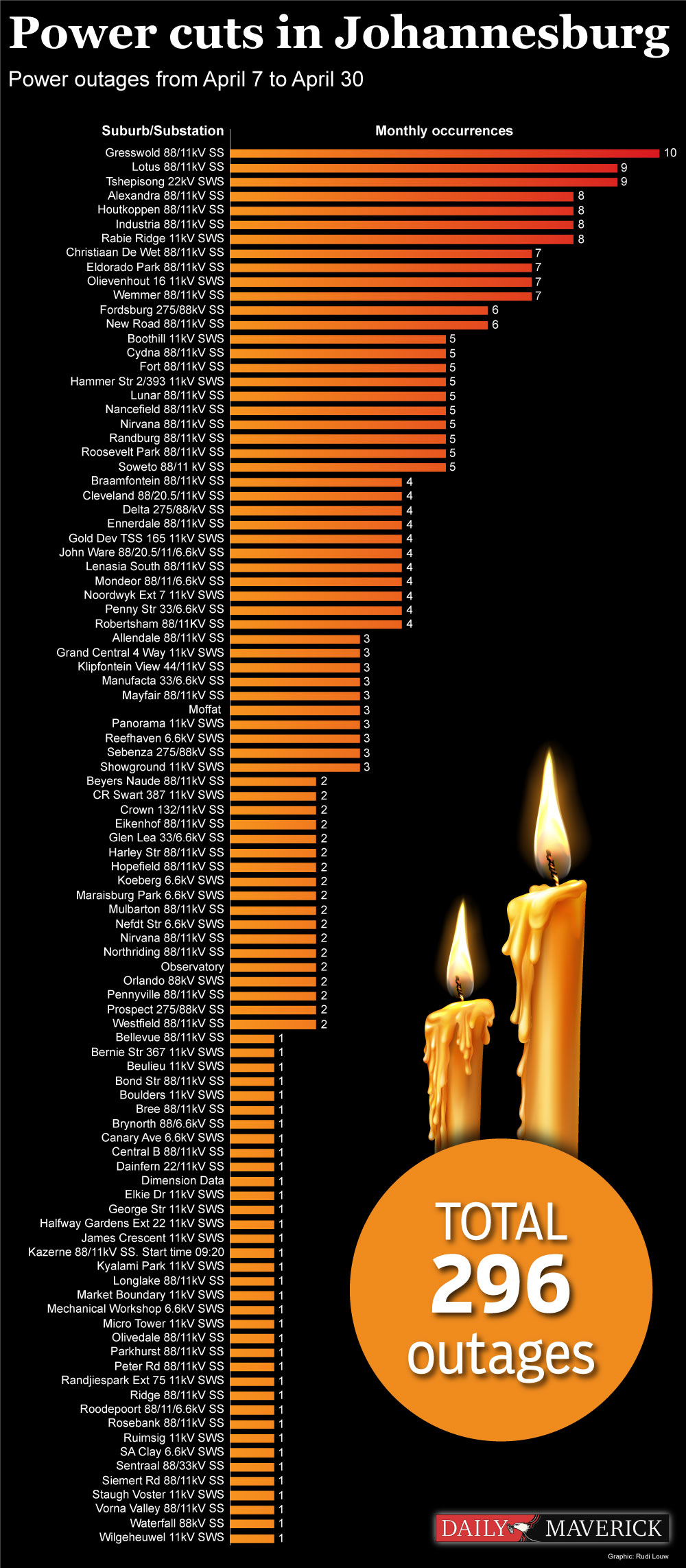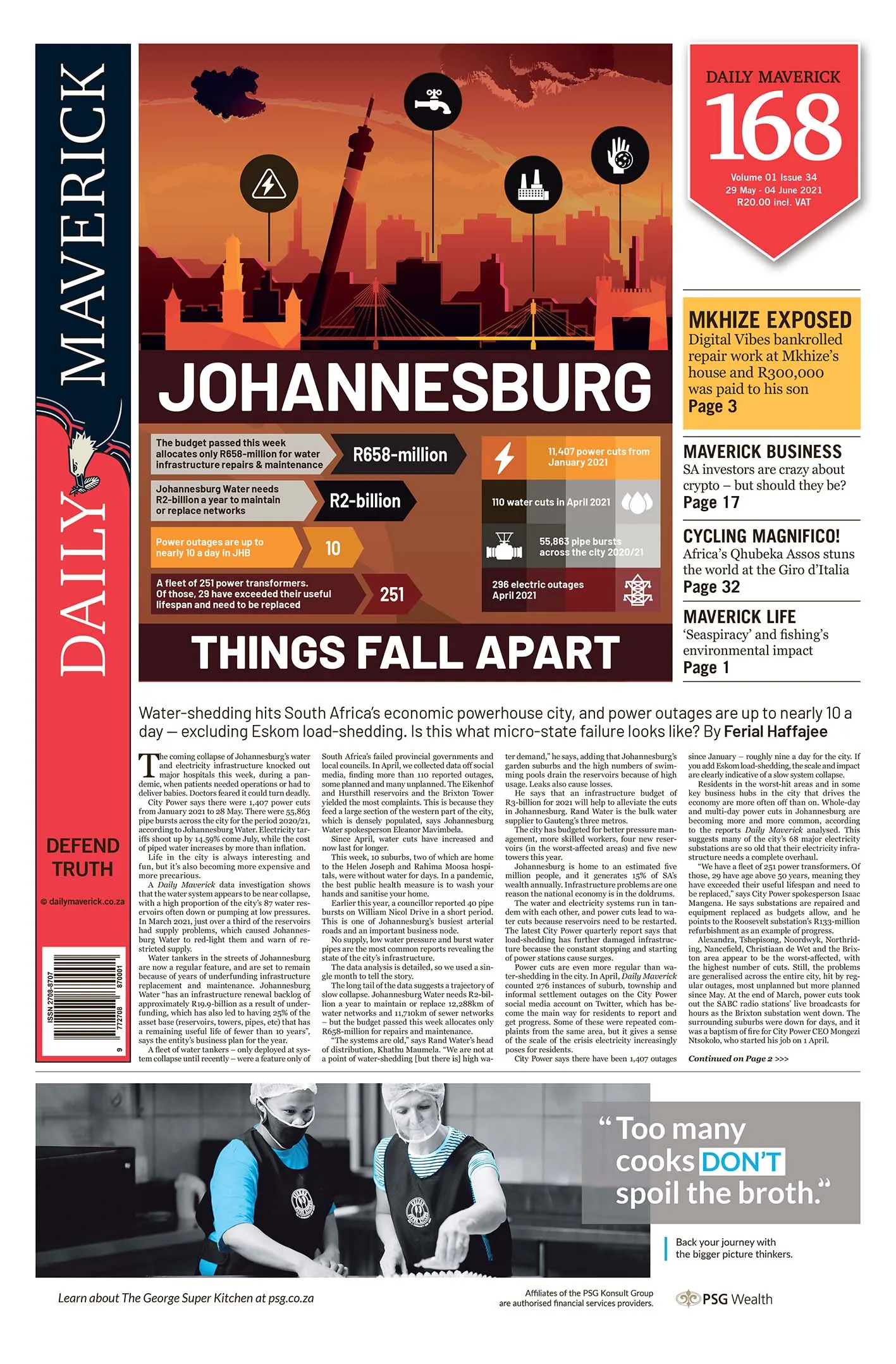First published in the Daily Maverick 168 weekly newspaper.
For many Johannesburg residents, electricity is more often off than on. City Power says there were 1,407 power cuts from January 2021 to 28 May – excluding Eskom load shedding. The water and electricity systems run in tandem, and power cuts lead to water cuts because reservoirs need to be restarted. The latest City Power quarterly report says that load shedding has further damaged infrastructure because the constant stopping and starting of power stations cause surges.
Power cuts are even more regular than water shedding in the city. In April, Daily Maverick counted 276 instances of suburb, township and informal settlement outages on the City Power social media account on Twitter, which has become the main way for residents to report and get progress (see graphic). Some of these were repeated complaints from the same area, but it gives a sense of the scale of the crisis electricity increasingly poses for residents.
City Power says there have been 1,407 outages since January – roughly nine a day for the city. If you add Eskom load shedding, the scale and impact are clearly indicative of a slow system collapse.
Residents in the worst-hit areas and in some key business hubs in the city that drives the economy are more often off than on. Whole-day and multiday power cuts in Johannesburg are becoming more and more common, according to the reports Daily Maverick analysed.
“We have a fleet of 251 power transformers. Of those, 29 have age above 50 years, meaning they have exceeded their useful lifespan and need to be replaced,” says City Power spokesperson Isaac Mangena. He says the city’s 68 substations are repaired and equipment replaced as budgets allow, and he points to the Roosevelt substation’s R133-million refurbishment as an example of progress.
Alexandra, Tshepisong, Noordwyk, North Riding, Nancefield, Christiaan de Wet and the Brixton area appear to be the worst affected, with the highest number of cuts. Still, the problems are generalised across the entire city, hit by regular outages, most unplanned but more planned since May. At the end of March, power cuts took out the SABC radio stations’ live broadcasts for hours as the Brixton substation went down. The surrounding suburbs were down for days, and it was a baptism of fire for City Power CEO Mongezi Ntsokolo, who started his job on 1 April.
We accompanied city officials on a walkabout in the last week of May and were shown many illegal connections, which also caused blackouts. “The majority of the outages are due to cable theft, cable faults and trips due to illegal connections,” says Mangena.
Cuts can be short but frequent. They can last for several hours, which is devastating for small businesses. Small business and light manufacturing nodes in Alexandra, Industria, Crown, Kaserne, Christiaan de Wet and Olivedale report regular outages, and so does the retail and financial sector node in Rosebank. The City Power report says the length of power cuts and the inability to restore the majority within 7.5 hours is a high-risk factor for the utility.
South Africa’s post-Covid-19 economic recovery plan is built on the twin pillars of small business development and manufacturing, but Johannesburg’s power cuts bedevil these sectors of such great potential. Businesses that can afford to are now adding generator costs or going off-grid in their business plans.
When he presented the city’s R73-billion budget last week, MMC for Finance Jolidee Matongo said more and more businesses were going off-grid, threatening city revenues. The City Power quarterly report warns that “[An] inability to implement refurbishment, asset renewal and expansion due to inadequate capital budget may lead to poor network performance and service delivery.” The city will spend up to 40% of the budget on staff costs, which increasingly crowd out spending on infrastructure.
“The city grid is ancient, and there has been no effort to upgrade it in 20 years,” says DA city councillor Nicole van Dyk. Through the years, the infrastructure has been run down. Van Dyk has oversight of Johannesburg Water and of City Power for the DA. “The mini substations stand open, and there are a couple of thousand [of them across the city]. Most are unlocked and occupied by the homeless,” she says.
Van Dyk and her team have repeatedly suggested better security and locks as quick workarounds to City Power teams to protect the mini substations, but these have not been provided, she says. And she confirms that the wealthier suburbs show a trend towards leaving the grid and taking their electricity taxes with them. “Revenue comes down. You can’t tax the sun to keep the city functioning,” she says.
Johannesburg is home to an estimated five million people, and it generates 15% of SA’s wealth annually. Infrastructure problems are one reason the national economy is in the doldrums. Johannesburg is becoming like Lagos, a leading African city where the city runs despite its local government, not because of it. Power cuts are regular, and the use of generators is common. Generator sales are up across South Africa and as the CSIR reported earlier this year, load shedding was worse in 2020 than ever before.
It isn’t easy to call a collapse in a city as vibrant as Johannesburg, but when the network infrastructure that holds the metropolis together begins to flail and then to take down hospitals, the broadcaster and the economy, the red flags go up. The city carries the country and the collapse of one has an impact on the other. DM168
This story first appeared in our weekly Daily Maverick 168 newspaper which is available for free to Pick n Pay Smart Shoppers at these Pick n Pay stores.























 Become an Insider
Become an Insider
Delivered on a silver platter by the ANC!
Hmmm no wonder everyone wants to move to Cape Town! Even Cyrill! LOL!
As a resident of one of the many small failed municipalities, my message to the residents of Johannesburg: Brace yourselves. It only gets worse.
Yes, the infrastructure is collapsing, over the weekend, large parts of the city were also without water, because power was out due to cable theft at Eikenhoff substation. There is a failure to get to grips with cable theft and illegal connections, after many years. The city cannot function like this, it is going to collapse soon. The corruption, incompetence and maladministration is destroying the city and making it intolerable for residents and businesses. This is a real crisis.
Proudly brought to you by cANCer!
Who will buy Karpower’s electricity if the existing infrastructure cannot sustain proper delivery? There is a huge potential market for bolas (an old metal drum with holes in it to make fire) and coal. Mantashe is right- we are still going to need the collieries for many decades.
“A World Class African City” what an absolute joke! Ha Ha Ha! It has become just another African slum.
the parasite is killing the host
Discussion around South African dinner tables this week will be about #Resilience & #EnergySecurity
– BTW, every country has similar issues – but they all have a solution that we ignore
#LocalEnergy in the form of #RoofTopSolar & #CommunityMicroGrids
We are not powerless !
Three days so far without power in Newlands, and we don’t even know why yet. All apparently because the city fired most of its power contractors. I’ve just thrown away half the contents of my freezer. Meanwhile, the EFF is barricading local shops and attacking bypassers, but the cops do nothing. If the ANC wins the next Jhb by-election here, then I know the country is done. If the people don’t want change, there won’t be change.